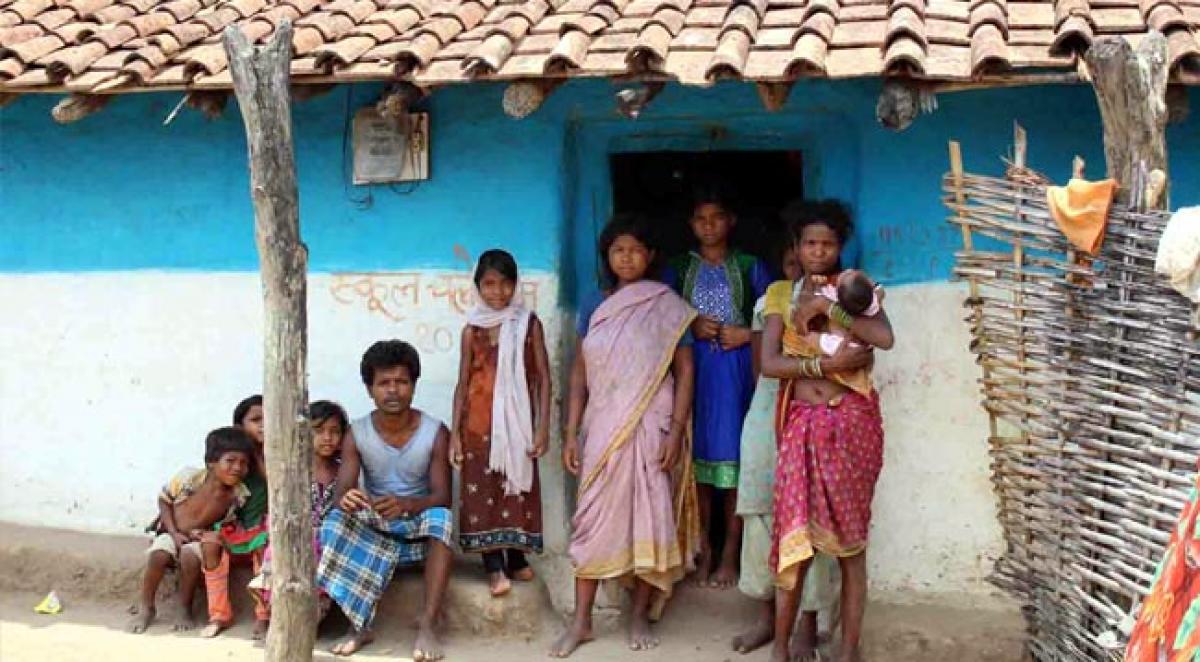Live
- GMR Airports Unveils AI-Powered Digital Twin Platform to Transform Airport Operations
- India poised to become leading maritime player: PM Modi
- Top Causes of Kidney Stones and How to Recognize Silent Symptoms
- India’s renewable energy capacity logs 14.2 pc growth at 213.7 GW
- Winter Session of Odisha Assembly adjourned sine die
- Biden calls Trump's tariff approach 'major mistake'
- After Drama Over Eknath Shinde’s Chief Minister Race, Maharashtra Cabinet Formation Faces New Tensions
- Egyptian FM, Blinken discuss recent developments in Syria
- Iran's supreme leader says Syria's developments result of US-Israeli 'plot'
- Elon Musk to Purchase $100 Million Luxury Mansion Next to Donald Trump's Mar-a-Lago, Report Reveals
Just In

Dheerwati, a member of the Baiga tribe, stands over some half acre of her dry patch of land, and points towards a luxurious resort -- one of her many nightmares.
Khatiya (Madhya Pradesh): Dheerwati, a member of the Baiga tribe, stands over some half acre of her dry patch of land, and points towards a luxurious resort -- one of her many nightmares.
"Those resort people have their eyes fixed on our field. Officials lure us to move. We don't have Patta (documents) for our land, we can't do anything," Dheerwati told this visiting IANS correspondent, in her village Khatiya of Mandla district in Madhya Pradesh.
Her village, situated in the buffer zone of Kanha National Park, is amongst the first human settlements outside the core zone of the reserve forest.
Dheerwati, her husband Sonu and six children live in a house that has self-baked Kavelu roof (tiles used across the tribal belt), an electric connection and a newly constructed toilet.
"We require some of the forest produce like bamboo to make a living. They don't allow us in the forests. We can't do anything to support ourselves," says Sonu.
Another tribal said that they are even beaten when caught inside the forest.
From an annual 2,000 tourists in 1980s to 1,50,000 at present, the resort business in the buffer zone of the forests has thrived the most, but at a cost to every tribal in some way. Many tribespersons could be seen begging for their pictures to be taken by the tourists.
Influential people, including some reputed wildlife conservationists, own a resort around Kahna and other national parks across India.
Tribals living in the buffer zone say that they are being "urged" to move by choosing one of the "government relocation packages" i.e "land against land" or "Rs 10 lakh per adult". Officials however deny this.
"No village from the buffer zone is to be shifted. However, if they leave voluntarily, they will avail benefit of the packages," J.S. Chauhan, Field Director of Kanha National Park, told IANS. He added that villages from the core zone only are being shifted.
Villages populating the 1,134 sq km of Kanha's buffer zone, after the families of Gond and Baiga, were either 'voluntarily' or 'illegally' evicted from forests on the name of 'conservation'.
As the tribes have inhabited the forests for generations it's their legal right to live there with some limitations, as also assured to them in the Forest Rights Act (FRA). However, norms are seldom followed during eviction.
"Most of the families were moved without legal framework. FRA gives tribals an option to continue living in the core zone or move voluntarily. But no one was told that they had a choice and many were forced to sign the papers," Sophie Grig, from Survival International, told IANS.
"An official told us to sign a letter of consent quickly. He said that we would get money or that we would go to another village. They were determined to destroy our village," a tribal from a relocated village, called Jholar, said in a letter to Madhya Pradesh Human Rights Commission.
Another tribal, Lakhand Merabi, declared, "Irrespective of what happens to us, we will stay here."
But he had to leave. Over 1,400 families from nine villages of the Baiga and Gond tribes were moved from the core forest area between 2010 to 2015.
A village named Kariwah was moved this year. "One more is in the pipeline," said a forest official. About seven villages still exist in the core zone of Kanha while over 36 had been moved slowly since 1969.
The number of people relocated remains unknown.
While many tribal families didn't like leaving, some families preferred relocation and also benefited through education for their children.
"Some Gond families were happy to relocate but most were not," Sophie said.
Ramkali Durbe and Sukhbati Durbe, who are now guides at Kanha, reflect the positive side of relocation and efforts by the forest department.
"I know these forests like my home, and love to show people around," Ramkali, whose village in Mukki zone of Kanha was shifted few years back, told IANS.
However, the issue of 'social security' - a new concept for those relocated -- continues to haunt.
"Most of those relocated prefer living in the vicinity of their relatives for the sense of security," Chauhan said.
Such cases are however not limited to Kanha alone. Khadia and Munda tribe in Odisha's Simlipal National Park and Baiga of Achanakmar Wildlife Sanctuary in Chhattisgarh are meeting the same fate in the name of tiger conservation.
However there are exceptions, Grig says, as the Solinga Tribes of BR Hills Tiger Reserve, in Karnataka, and Tharu tribes of Dudhwa Tiger Reserve, Uttar Pradesh, never shifted - and with little help they stand guard between poachers and the forest.

© 2024 Hyderabad Media House Limited/The Hans India. All rights reserved. Powered by hocalwire.com







